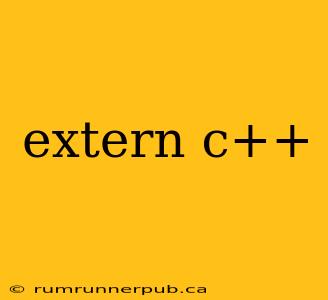C++ and C are closely related, but they have crucial differences in how they handle function and variable names. This can lead to problems when trying to link C++ code with C code (or vice-versa), which is where the extern "C" directive comes in. This article will explore its function and usage, drawing upon insights from Stack Overflow to provide practical examples and deeper understanding.
What is extern "C"?
The core issue lies in name mangling. C++ compilers modify function and variable names during compilation – a process called name mangling – to incorporate information about function overloading, argument types, and other details. C compilers, on the other hand, don't perform name mangling in the same way. This means that if your C++ code calls a C function (or vice versa), the compiler won't be able to find the function because the names won't match.
extern "C" tells the C++ compiler: "Treat the following declaration as if it were written in C." This prevents name mangling, ensuring that the C++ compiler generates a symbol name compatible with the C compiler's output.
Example: Linking C and C++
Let's consider a simple example (inspired by discussions on Stack Overflow):
C Code (my_c_function.c):
#include <stdio.h>
void my_c_function(int a, int b) {
printf("C function called with a = %d, b = %d\n", a, b);
}
C++ Code (my_cpp_function.cpp):
#include <iostream>
extern "C" void my_c_function(int a, int b); // Declaration with extern "C"
int main() {
my_c_function(5, 10);
return 0;
}
In this example, extern "C" in the C++ code instructs the compiler to treat my_c_function as if it were declared in a C file. Without extern "C", the C++ compiler would mangle the name, causing a linker error when trying to link the C and C++ object files.
Stack Overflow Insights:
Many Stack Overflow threads highlight common errors related to extern "C". For example, forgetting the extern "C" declaration is a frequent mistake, leading to undefined symbol errors during linking. Understanding the importance of consistent declarations across C and C++ code is crucial (as detailed in numerous SO posts discussing linking issues).
Why is this important?
Using extern "C" is critical when:
- Interfacing with legacy C code: Many large projects rely on existing C libraries, and
extern "C"enables seamless integration with them. - Improving compatibility: It ensures portability across different compilers and platforms where name mangling conventions might vary.
- Avoiding compilation errors: It resolves the common linking errors arising from mismatched name mangling.
Beyond the Basics:
extern "C" can also be applied to entire header files:
extern "C" {
#include "my_c_header.h"
}
This is useful when dealing with a header file containing multiple C functions.
Conclusion:
The extern "C" directive is a crucial tool for bridging the gap between C and C++ code. Understanding its role in preventing name mangling allows developers to successfully integrate C libraries into C++ projects and avoid common linking errors. By carefully following the principles discussed here, and by consulting resources like Stack Overflow for solutions to specific problems, you can effectively utilize this powerful language feature. Remember to always carefully check your declarations and linkage to ensure seamless interoperability between C and C++ code.
